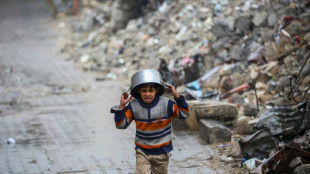
-
 Four bodies, four survivors recovered from Egypt Red Sea sinking: governor
Four bodies, four survivors recovered from Egypt Red Sea sinking: governor
-
Ayub century helps Pakistan crush Zimbabwe, level series

-
 French court cracks down on Corsican language use in local assembly
French court cracks down on Corsican language use in local assembly
-
Prosecutors seek up to 14-year terms for French rape trial defendants

-
 Russia expels UK diplomat accused of espionage
Russia expels UK diplomat accused of espionage
-
Israeli security cabinet to discuss ceasefire as US says deal 'close'

-
 COP29 president blames rich countries for 'imperfect' deal
COP29 president blames rich countries for 'imperfect' deal
-
Stocks retreat, dollar mixed on Trump tariff warning

-
 No regrets: Merkel looks back at refugee crisis, Russia ties
No regrets: Merkel looks back at refugee crisis, Russia ties
-
IPL history-maker, 13, who 'came on Earth to play cricket'

-
 Ukraine says Russia using landmines to carry out 'genocidal activities'
Ukraine says Russia using landmines to carry out 'genocidal activities'
-
Prosecutors seek up to 12-year terms for French rape trial defendants

-
 'Record' drone barrage pummels Ukraine as missile tensions seethe
'Record' drone barrage pummels Ukraine as missile tensions seethe
-
Laos hostel staff detained after backpackers' deaths

-
 Hong Kong LGBTQ advocate wins posthumous legal victory
Hong Kong LGBTQ advocate wins posthumous legal victory
-
Ukraine says cannot meet landmine destruction pledge due to Russia invasion

-
 Rod Stewart to play Glastonbury legends slot
Rod Stewart to play Glastonbury legends slot
-
Winter rains pile misery on war-torn Gaza's displaced

-
 'Taiwan also has baseball': jubilant fans celebrate historic win
'Taiwan also has baseball': jubilant fans celebrate historic win
-
Russia pummels Ukraine with 'record' drone barrage

-
 Paul Pogba blackmail trial set to open in Paris
Paul Pogba blackmail trial set to open in Paris
-
China's Huawei unveils 'milestone' smartphone with homegrown OS

-
 Landmine victims gather to protest US decision to supply Ukraine
Landmine victims gather to protest US decision to supply Ukraine
-
Indian rival royal factions clash outside palace

-
 Equity markets retreat, dollar gains as Trump fires tariff warning
Equity markets retreat, dollar gains as Trump fires tariff warning
-
Manga adaptation 'Drops of God' nets International Emmy Award

-
 China's Huawei launches 'milestone' smartphone with homegrown OS
China's Huawei launches 'milestone' smartphone with homegrown OS
-
Philippine VP denies assassination plot against Marcos

-
 Four Pakistan security forces killed as ex-PM Khan supporters flood capital
Four Pakistan security forces killed as ex-PM Khan supporters flood capital
-
Hong Kong's legal battles over LGBTQ rights: key dates

-
 US lawmakers warn Hong Kong becoming financial crime hub
US lawmakers warn Hong Kong becoming financial crime hub
-
Compressed natural gas vehicles gain slow momentum in Nigeria

-
 As Arctic climate warms, even Santa runs short of snow
As Arctic climate warms, even Santa runs short of snow
-
Plastic pollution talks: the key sticking points

-
 Indonesia rejects Apple's $100 million investment offer
Indonesia rejects Apple's $100 million investment offer
-
Pakistan police fire tear gas, rubber bullets at ex-PM Khan supporters

-
 Ronaldo double takes Al Nassr to brink of AFC Champions League last 16
Ronaldo double takes Al Nassr to brink of AFC Champions League last 16
-
Pakistan police fire tear gas, rubber bullets at pro-Khan supporters

-
 Hong Kong same-sex couples win housing, inheritance rights
Hong Kong same-sex couples win housing, inheritance rights
-
Indonesia digs out as flooding, landslide death toll hits 20

-
 Liverpool's old guard thriving despite uncertain futures
Liverpool's old guard thriving despite uncertain futures
-
Mbappe takes reins for Real Madrid in Liverpool clash

-
 As AI gets real, slow and steady wins the race
As AI gets real, slow and steady wins the race
-
China's Huawei to launch 'milestone' smartphone with homegrown OS

-
 Porzingis and Morant make triumphant NBA returns
Porzingis and Morant make triumphant NBA returns
-
Hong Kong top court affirms housing, inheritance rights for same-sex couples

-
 Philippines, China clashes trigger money-making disinformation
Philippines, China clashes trigger money-making disinformation
-
Most Asian markets drop, dollar gains as Trump fires tariff warning

-
 England 'not quivering' ahead of New Zealand Test challenge
England 'not quivering' ahead of New Zealand Test challenge
-
Bethell to bat at three on England Test debut against New Zealand


Boosting Ukraine's anti-air batteries proves easier said than done
Joe Biden has promised to help Ukraine get air defense systems with a longer range than the shoulder-borne Stinger missiles already on the ground, but finding the powerful anti-missile batteries Ukraine's military so urgently needs is proving easier said than done.
The US president, who wants to support Ukraine militarily without entering into direct conflict with Russia, is seeking to provide better defenses against the Russian artillery that is pounding its cities.
The ideal armament to do that would be mobile anti-aircraft batteries of the Patriot type, whose effectiveness has been amply demonstrated in recent years in Iraq and the Persian Gulf.
Loaded onto trucks, the Patriot has a radar capable of automatically detecting and intercepting an aircraft, drone or missile within a radius of more than 60 miles (100 kilometers), as well as a surveillance post manned by three soldiers and a battery of interceptor missiles.
But Ukraine's army is not trained to handle the sophisticated US weaponry. On the other hand, they know how to handle the S-300 anti-aircraft system, a first-generation Russian competitor to the US Patriot, whose range is more limited but which would be sufficient to protect Kharkiv or Kyiv, two cities close to the Russian border, where most of the missiles that pound them are fired from.
These S-300s could come from former Soviet bloc countries that still deploy them, in particular Slovakia and Bulgaria, where US Defense Secretary Lloyd Austin has been visiting in recent days.
But those countries still depend on the S-300 for their own security and are demanding a substitute -- in other words, Patriots -- before giving them to Ukraine.
"We're willing to do so immediately when we have a proper replacement," Slovak Defense Minister Jaroslav Nad told reporters on Thursday during a meeting with Austin in Bratislava.
- 'Not enough' -
On Friday, the Netherlands said it would deploy a Patriot battery to the Sliac military base in central Slovakia, and Germany confirmed it would send two more batteries to the country, which could facilitate the transfer of Slovakia's only S-300 battery to Ukraine.
But the German and Dutch Patriots will not arrive in Slovakia immediately -- the Netherlands expects delivery would be on April 15 at the earliest -- and time is running out for the Ukrainian army.
While several countries may be ready to supply Kyiv with spare missiles for the S-300, Ukraine needs a lot of complete systems, including radars and monitoring stations.
"One S-300 is better than none," said Brent Eastwood, defense editor at 1945, a foreign policy web magazine. But "it's still not enough."
Ukraine had around 100 S-300 batteries before President Vladimir Putin launched his invasion last month, and the Russian army claims to have destroyed about 40 at the very outset of the war on February 24, Easton, a former US soldier, recently wrote.
The country is vast, and just protecting a city takes a lot, he told AFP.
"If I were a war planner for Ukraine, I would want four S-300 batteries for each quadrant of Kyiv. This deployment would make me sleep better at night," he said.
One other NATO country, Greece, has S-300s, but they, too, will need to be offered replacements. However, even if the Pentagon, whose Patriot inventory is relatively limited, decides to lend its Patriots to these countries, it will take several weeks for them to reach their destination.
Washington is trying to convince allies in other regions to lend theirs, but again, it is not straightforward.
US Chief of Staff General Mark Milley may have asked Japan for help on Thursday.
He phoned his Japanese counterpart to discuss "the current security environment in the Pacific and Russia's ongoing invasion of Ukraine," according to an account of their conversation released Friday by the Pentagon.
The Gulf countries have numerous anti-aircraft batteries to protect themselves from Iranian missiles, but they do not seem in a hurry to come to the aid of Ukraine.
Saudi Arabia and the United Arab Emirates, which are among the world's biggest crude exporters and both have strong ties to both the West and to Moscow, have so far avoided taking any stance against Russia.
B.Shevchenko--BTB
